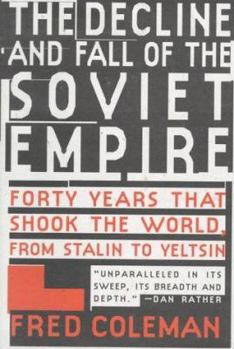The Decline and Fall of the Soviet Empire: Forty Years That Shook the World, from Stalin to Yeltsin
Select Format
Select Condition 
Book Overview
For this authoritative work on the slow collapse of the Soviet Union, Fred Coleman draws on over thirty years of first-hand observations and personal experiences as a Moscow correspondent. Having... This description may be from another edition of this product.
Format:Hardcover
Language:English
ISBN:0312143125
ISBN13:9780312143121
Release Date:January 1996
Publisher:St. Martin's Press
Length:459 Pages
Weight:1.88 lbs.
Dimensions:1.4" x 6.6" x 9.6"
Customer Reviews
3 ratings
Interesting 'Point of View'
Published by Thriftbooks.com User , 22 years ago
For someone such as myself who is interested but not obsessed with Soviet history, this was an interesting read. I'm not sure I agree with the author's belief that America is partly to blame for Communism lasting as long as it did, but I did find his 'take' on it very interesting. The Soviet Union were master's of deception. It's not hard to believe why we (Americans) were a little intimidated by them. All in all, this was a good read. I give it 4 stars because I didn't get bored with it.
At times tedious, but excellent eyewitness history, policy
Published by Thriftbooks.com User , 23 years ago
Fred Coleman was a journalist who spent decades behind the Iron Curtain in the Soviet Union, and this book collects his various observations and his policy interpretations on that experience and his concerns about the nation's future. It's rousing eyewitness history; Coleman's insights on the long-term damage done by Stalinism, and the immeasurable psychological harm it wrought in family after family, are rendered poignantly. His account on the transfer of power from Stalin to Brezhnev-- nearly involving a shootout-- was extraordinary and little-appreciated in the West. Coleman gives a Soviet perspective for what it was like to live under Khruschchev and Brezhnev, and indicates that the citizens of the country were often quite cynical and unhappy about their leadership, a perspective not often obtained. He notes that the USSR's economic quagmire was evident to Andropov in the early 80's but hidden from most other policymakers (and from the U.S.), and he expounds in wonderful detail on the Afghan War and Chernobyl, including interviews with Soviet citizens that convey the trauma of those fiascoes and how important they were in precipitating the USSR's fall in 1991. Finally, Coleman's discourse on USSR-China relations is outstanding. It was little appreciated in the West how sour relations were between these two nations, despite both being led by Communist apparatchiks. Coleman unveils the ancient conflict between the two countries, the border disputes, the bitter cultural and economic altercations and the competition for leadership of the Communist party. This was rarely appreciated in the U.S. My main cavil pertains to the way the author proclaims and supports his book's primary argument: that lack of U.S. perception of the USSR's weakness led to many missed opportunities in weakening the country. It's drummed in numerous times throughout the book's pages, but the way it's presented here seems to my mind to neglect the palpable fear of nuclear war during the 1960s and 1970s; indeed, in the examination of the Cuban Missile Crisis, it seems fortunate indeed that we did not try to strongarm the Soviet Union, else we'd be in post-Apocalyptic Mad Max land by now! Furthermore, one less-emphasized but fascinating point made in the book is that a mistake in the Carter administration actually led to a bigger blunder by Brezhnev. That is, there had been some saber-rattling by Brezhnev in the late 1970s toward the Baltics and some neighboring regions, to which Carter did not respond. Brezhnev took a cue and assumed that the U.S. would allow the USSR to aggrandize itself territorially with relatively little objection-- leading to the Afghanistan intervention, and its kneecapping of the Soviet economy and support system. If this is the case, then if anything it was precisely that overestimation of Soviet capabilities by Carter (not a recognition of its weakness) that was so responsible, albeit indirectly, for the later Soviet collapse. A quite
How Lenin ended up in the Tomb
Published by Thriftbooks.com User , 24 years ago
David Remnick's "Lenin's Tomb" remains THE definitive account of the fall of the Soviet Union. Fred Coleman's book is much more abstract, focussing on root historical causes rather than reports from the field as events happened. Coleman's main argument in the book, that the West could have forced the collapse of the Soviet Union through a more agressive foreign policy as early as the mid 1950s, is the most controversal argument he makes. Coleman believes that Hungary and later Czechoslovakia could have been freed from Soviet clutches in 1956 and 1967 respectively had the West only shown a willingness to flex its military muscle. Coleman argues that the Soviet military was always a paper tiger and that Soviet leaders were merely bluff an bluster. The only problem with this argument is that had the West followed Coleman's course of action, nuclear anihilation may have resulted. Still, this is a worthwhile book for those interested in the Cold War and how the Soviets lost it.






